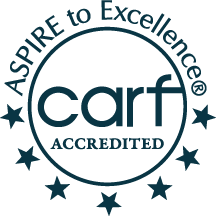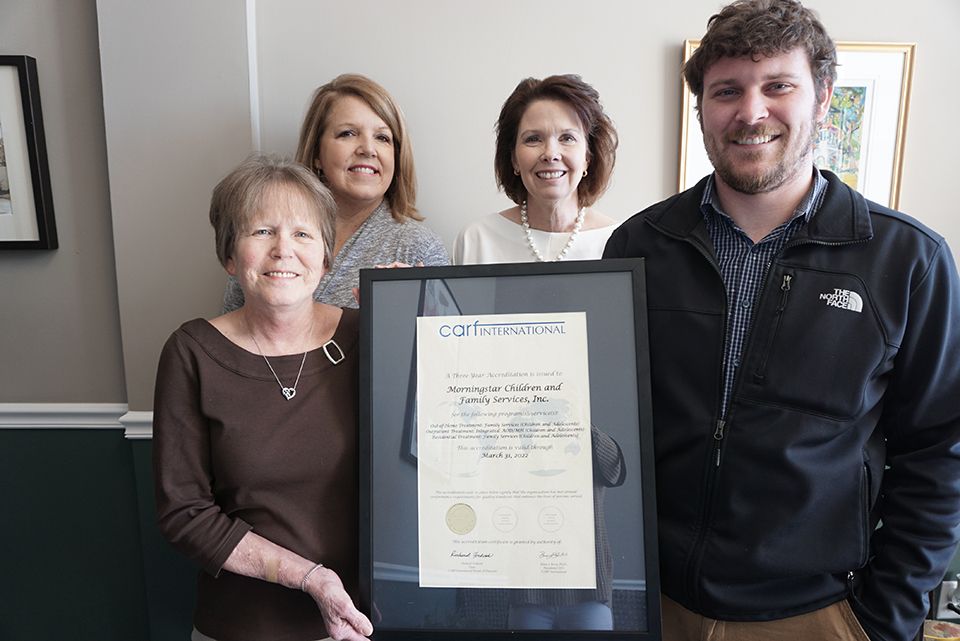Accreditations
Morningstar Children and Family Services, Inc. is a CARF® accredited organization. We have received this high level of accreditation consecutively since 2007. Our three-year accreditation was recently renewed in January of 2019, and will extend through March 31, 2025. It applies to the following program(s) service(s):
- Out-of-Home Treatment: Family Services (Children and Adolescents)
- Outpatient Treatment: Integrated: AOD/MH (Children and Adolescents)
- Residential Treatment: Family Services (Children and Adolescents)


Why does accreditation matter?
Consumers face a variety of options when deciding what services to use and who should provide them. Accreditation is a sign of quality and is an important consideration in their decision making. The value of accreditation goes beyond a competitive distinction for service provider by providing a framework for continuous quality improvement.
How is accreditation achieved?
- Achieving accreditation requires a service provider to commit to quality improvement, focus on the unique needs of each person the provider serves, and monitor the results of services.
- A service provider begins the accreditation process with an internal examination of its program and business practices. Then the provider requests an on-site survey that will be conducted by a team of expert practitioners selected by CARF. During the survey, the provider must demonstrate that it conforms to a series of rigorous and internationally recognized CARF standards.
- Based on the results of the survey, CARF prepares a written report of the provider’s strengths and areas for improvement. If a provider has sufficiently demonstrated its conformance to the standards, it earns CARF accreditation.
- After receiving the report, the provider must submit a Quality Improvement Plan (QIP) to CARF to show how it is addressing any areas for improvement. Then, each year during the term of accreditation, the provider must submit a report to CARF documenting additional improvements it has made.
CARF’s ASPIRE to Excellence Quality Framework
In response to today’s rapidly changing human services environment, CARF has introduced the ASPIRE to Excellence® quality framework. This practical method for continuous improvement seamlessly integrates all organizational functions and the engaged input of all stakeholders. In this framework, CARF’s business practice standards provide a logical, action-oriented approach to ensure that organizational purpose, planning, and activity result in the desired outcomes.
Assess the Environment. To be relevant and responsive in a rapidly changing environment, the organization must be vigilant of the context in which it conducts its business affairs. The role of leadership is critical to environmental assessment.
Set Strategy. Setting strategy is the activity of understanding the environment and organizational competencies, identifying opportunities and threats, and articulating a high-level map of the direction to take in order to achieve, sustain, and advance organizational purpose in a competitive environment.
Obtain Input. In a service environment, organizational success cannot be achieved or sustained without success for the persons served. Actively engaging the persons served and other stakeholders as part of the planning and service processes has been demonstrated to result in better outcomes. In fact, the more the organization obtains feedback relative to all appropriate organizational functions, the better the outcomes reported. This input process engages all parties in a sense of shared future that promotes long-term organizational excellence and optimal outcomes.
Implement the Plan. The strategic plan, based on a thorough assessment of environmental factors, provides a roadmap to achieving organizational purpose. To actually achieve its purpose, the organization must translate strategic goals into tangible action. Only by setting specific, measurable goals and tracking performance can the organization determine the degree to which it is achieving the desired service and business outcomes.
Effect Change. Following the review and analysis of results, the organization must carefully evaluate the information learned so that it may be translated into focused actions to improve performance against targets. The evaluation drives the organization to engage in a dynamic, proactive process to review, renew, or revise its strategy and tactics, while ensuring alignment of organizational purpose, service and business practices, and organizational resources. Achieving excellence requires a disciplined continuous improvement process.
About Morningstar
Morningstar Children and Family Services was established in 1996. Today we have a team of over 100 staff members serving hundreds of children annually.